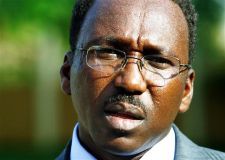Envoys from 18 countries, UN meet in Libya on Darfur crisis
July 15, 2007 (TRIPOLI, Libya) — Representatives from the U.N., African Union and 18 countries were in Libya on Sunday in an effort to promote a political solution to the four-year-old conflict in Sudan’s western war-torn Darfur region.

The meeting hopes to “prepare an international vision on how to solve the Darfur crisis,” al-Treiki told The Associated Press. He said another conference would be held in September to put the last touches on an agreement.
U.N. envoy Jan Eliasson; his A.U. counterpart, Salim Ahmed Salim; and U.S. envoy to Sudan, Andrew Natsios; were among the representatives at the meeting. Following several opening speeches, representatives went into a closed door session.
The meeting in Libya comes as five Darfur rebel groups agreed to join forces to push for a solution to the crisis. The new coalition, which is called the United Front for Liberation and Development, was announced Saturday in Eritrea.
Representatives of some Sudanese rebel groups were also in Libya Sunday, but they weren’t taking part in the meeting.
Last month, Eliasson said the road to negotiations among rebel groups and the Sudanese government has become even more complicated because of the increasing number of rebel groups. In just three weeks, the number of opposition movements jumped from nine to 12, and he said that number could rise.
Ahmed Tughod Lissan, a spokesman for the Justice and Equality Movement rebel group in Sudan, expressed hope that the meeting would find a just solution to the Darfur crisis. But he also warned that engaging small, splinter groups in negotiations could keep progress from moving forward.
“The influential (rebel) movements should be engaged in finding the solution and not small splinter groups that do not truly represent the Darfur people,” Lissan told the AP.
Lisan’s group, which wasn’t one of the five that formed the coalition in Eritrea, opposes the Darfur Peace Agreement, which signed last year by one rebel group faction and the Sudanese government. But the peace agreement has been ineffective because other rebel groups have rejected the peace agreement, saying it is insufficient.
(AP)
